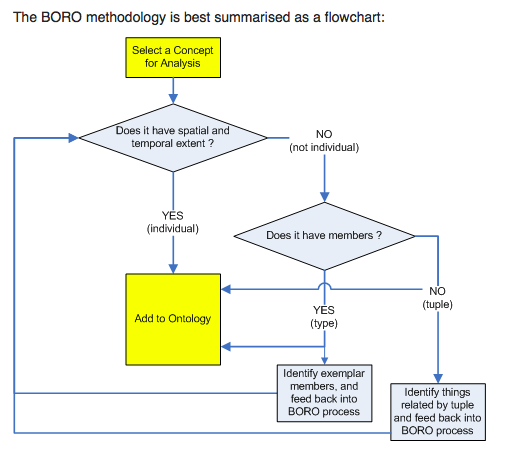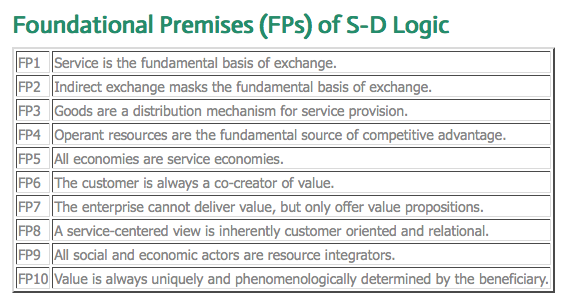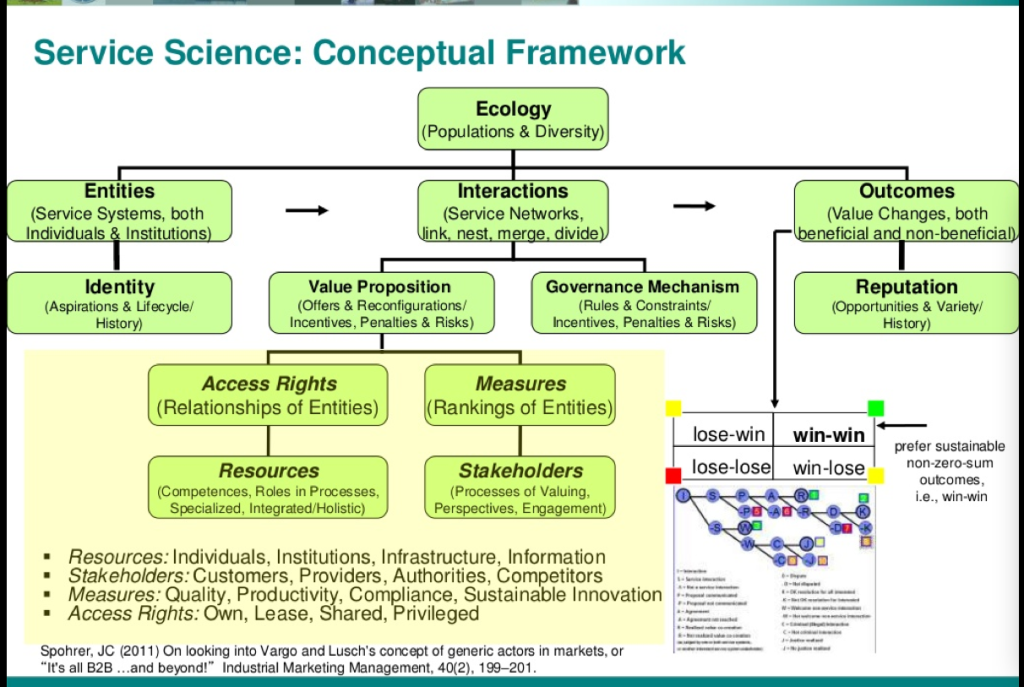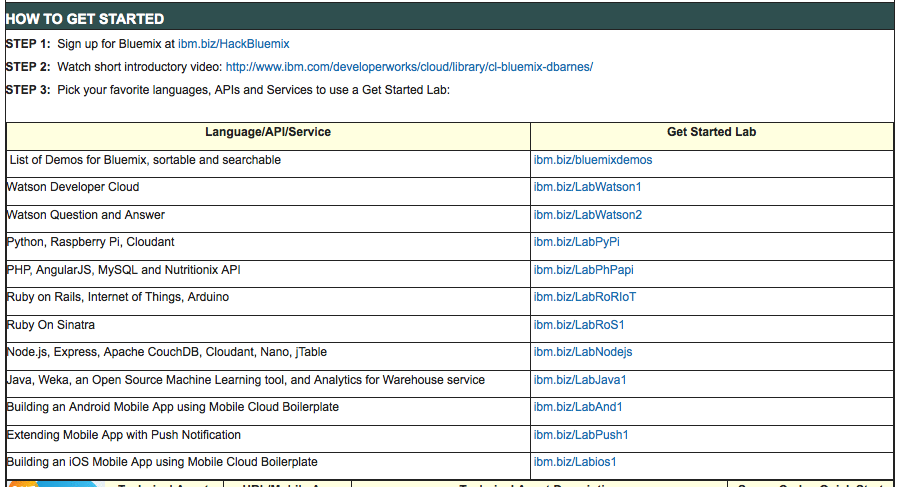Four of us met recently do work on concept mapping at SJSU Business School Santa Clara campus. Prof. Steve Kwan (SJSU), Yassi Moghaddam (ISSIP), Jim Spohrer (IBM), and Fan Xiucheng (Fudan).
We reviewed the BORO Method.

We studied S-D Logic Foundational Propositions.

We studied Service Science Foundational Concepts:

Extract 28 phrases/candidate concepts from S-D Logic propositions:
- 11 ways to refer to entities (most with rights and responsibility, owned by, or composed of)
- Resource integrator
- Customer
- Beneficiary
- Actor
- Social and economic actor
- Enterprise
- Operant Resources (people)
- Economies
- Service economies
- Co-creator of value
- Goods
- 17 other concepts
- Value
- Value in exchange
- Value in use
- Value in context
- Fundamental basis of exchange
- Indirect exchange
- Exchange
- Economic Exchange
- Market Exchange
- Social Exchange
- Interaction
- Competitive advantage
- Distribution mechanism
- Uniquely and phenomenologically determined
- Inherently customer oriented and relational
- Service
- Service Oriented view (people have view; a service oriented is a view)
- Value proposition (people can communicate a value proposition, organization can communicate value proposition)
Extracted 16 phrases/candidate concepts from Service Science: Conceptual Framework
- Ecology
- Entity
- Interaction
- Outcome
- Value Propositions
- Governance Mechanisms
- Access Rights
- Resources
- Measures
- Stakeholders
- Identity
- Reputation
- Capabilities
- Constraints
- Rights
- Responsibilities
We then created the following 41 knowledge triples (relationship concept1 concept2) as part of a concept map:
[isa service_system_entity entity]
[isa resource_integrator entity]
[isa customer entity]
[isa beneficiary entity]
[isa actor entity]
[isa social_and_economic_actor entity]
[isa enterprise entity][isa operant_resource entity]
[isa co-creator_of_value entity]
[isa economy entity]
[isa service_economy entity]
[isa goods resource]
[isa operand_resource resource]
[isa operant_resource resource]
[isa entity resource]
[isa value expected_outcome]
[isa value perceived_outcome]
[isa value realized_outcome]
[typeof expected_outcome outcome]
[typeof perceived_outcome outcome]
[typeof realized_outcome outcome]
[typeof value_in_exchange value]
[typeof value_in_use value]
[typeof value_in_context value]
[isa fundamental_basis_of_exchange interaction]
[isa indirect_exchange interaction]
[isa direct_exchange interaction]
[isa economic_exchange interaction]
[isa social_exchange interaction]
[isa market ecology]
[propertyof entity competitive_advantage]
[propertyof offering distribution_mechanism]
[isa offering value_proposition]
[propertyof interaction uniquely_and_phenomenologically_determined]
[propertyof entity view]
[typeof service-oriented_view view]
[propertyof service inherently_customer-oriented_and_relational]
[typeof value_proposition interaction]
[typeof governance_mechanism interaction]
[typeof service interaction]
[typeof service outcome]
[typeof service entity]
Before doing the above we spent time building a concept map for the type of service system known as a college, university, institute of higher education. The idea was do case-based-reasoning before looking at knowledge triples (relationship concept1 concept2) for a concept map. We generated a very large number of knowledge triples including:
[hasrole faculty university]
[hasrole student university]
[hasrole parent university]
[hasrole deans university]
[hasrole staff university]
[hasrole administration university]
[hasrole teaching_assistant university]
[hasrole adjunct_faculty university][hasrole alumni university]
[hasrole prospects university]
[hasplace campus university]
[hasplace facilities university]
[hasplace classroom university]
[hasplace laboratory university]
[hasplace faculty_office university]
[hasplace administrator_office university]
[hasplace library university]
[hasplace sports_stadium university]
[hasplace dormitory university]
[hasplace dorm_room university]
[hasplace cafeteria unversity]
[teaches faculty students]
[managers deans faculty]
[teachin faculty classroom]
[learnsfrom students faculty]
[haspart campus facility]
[haspart building classroom]
[haspart classroom desks]
[haspart classroom seats]
[haspart classroom podium]
[haspart dormitory dorm_room]
[admits admissions prospect]
[rejects admissions prospect]
[waitlists admissions prospect]
I also wrote a Python program to extract information form MIT Concept Net 5.
[‘Antonym’, ‘university’, ‘primary_school’]
[‘AtLocation’, ‘atheist’, ‘university’]
[‘AtLocation’, ‘book’, ‘university’]
[‘AtLocation’, ‘classroom_chair’, ‘university’]
[‘AtLocation’, ‘computer’, ‘university’]
[‘AtLocation’, ‘druge’, ‘university’]
[‘AtLocation’, ‘hard_work_faculty’, ‘university’]
[‘AtLocation’, ‘landscape’, ‘university’]
[‘AtLocation’, ‘openmind’, ‘university’]
[‘AtLocation’, ‘plane’, ‘university’]
[‘AtLocation’, ‘professor’, ‘university’]
[‘AtLocation’, ‘projectile’, ‘university’]
[‘AtLocation’, ‘see_professor’, ‘university’]
[‘AtLocation’, ‘student’, ‘university’]
[‘AtLocation’, ‘teach_assistant’, ‘university’]
[‘AtLocation’, ‘thinker’, ‘university’]
[‘AtLocation’, ‘university’, ‘chemistry_lab’]
[‘AtLocation’, ‘venus’, ‘university’]
[‘CapableOf’, ‘university’, ‘honor_good_student’]
[‘EtymologicallyDerivedFrom’, ‘antiuniversity’, ‘university’]
[‘EtymologicallyDerivedFrom’, ‘multiversity’, ‘university’]
[‘EtymologicallyDerivedFrom’, ‘universitylike’, ‘university’]
[‘HasA’, ‘university’, ‘classroom’]
[‘IsA’, ‘university’, ‘academy’]
[‘IsA’, ‘university’, ‘college’]
[‘IsA’, ‘university’, ‘musical_instrument’]
[‘IsA’, ‘university’, ‘place’]
[‘IsA’, ‘university’, ‘place_for_learn’]
[‘IsA’, ‘university’, ‘school’]
[‘LocationOfAction’, ‘argue’, ‘university’]
[‘PartOf’, ‘department’, ‘university’]
[‘RelatedTo’, ‘academian/n’, ‘university’]
[‘RelatedTo’, ‘antiuniversity/a’, ‘university’]
[‘RelatedTo’, ‘asu’, ‘university’]
[‘RelatedTo’, ‘cantabrigian/a’, ‘university’]
[‘RelatedTo’, ‘college’, ‘university’]
[‘RelatedTo’, ‘dean/n’, ‘university’]
[‘RelatedTo’, ‘department’, ‘university’]
[‘RelatedTo’, ‘fac_brat/n’, ‘university’]
[‘RelatedTo’, ‘faculty/n’, ‘university’]
[‘RelatedTo’, ‘graduate/n’, ‘university’]
[‘RelatedTo’, ‘greek_house/n’, ‘university’]
[‘RelatedTo’, ‘hilary_term/n’, ‘university’]
[‘RelatedTo’, ‘laureate/n’, ‘university’]
[‘RelatedTo’, ‘legacy_student/n’, ‘university’]
[‘RelatedTo’, ‘major/v’, ‘university’]
[‘RelatedTo’, ‘nonuniversity/a’, ‘university’]
[‘RelatedTo’, ‘princeton/n’, ‘university’]
[‘RelatedTo’, ‘proproctor/n’, ‘university’]
[‘RelatedTo’, ‘rag_day/n’, ‘university’]
[‘RelatedTo’, ‘rag_week/n’, ‘university’]
[‘RelatedTo’, ‘repetitor/n’, ‘university’]
[‘RelatedTo’, ‘schoolman/n’, ‘university’]
[‘RelatedTo’, ‘sessional/n’, ‘university’]
[‘RelatedTo’, ‘student/n’, ‘university’]
[‘RelatedTo’, ‘tutor/n’, ‘university’]
[‘RelatedTo’, ‘undergraduate/n’, ‘university’]
[‘RelatedTo’, ‘university’, ‘degree’]
[‘RelatedTo’, ‘university’, ‘get’]
[‘RelatedTo’, ‘university’, ‘graduate’]
[‘RelatedTo’, ‘university’, ‘learn_place’]
[‘RelatedTo’, ‘university’, ‘school’]
[‘RelatedTo’, ‘uva’, ‘university’]
[‘UsedFor’, ‘student’, ‘university’]
[‘UsedFor’, ‘university’, ‘cooperation’]
[‘UsedFor’, ‘university’, ‘degree’]
[‘UsedFor’, ‘university’, ‘eat_food_with’]
[‘UsedFor’, ‘university’, ‘teach’]
Files: 2 Total Assertions: 1660281 English_assertions 1066922
[‘AtLocation’, ‘argue’, ‘university’]
[‘AtLocation’, ‘auditorium’, ‘university’]
[‘AtLocation’, ‘beautiful_mind’, ‘university’]
[‘AtLocation’, ‘college_student’, ‘university’]
[‘AtLocation’, ‘football_team’, ‘university’]
[‘AtLocation’, ‘hotdog’, ‘university’]
[‘AtLocation’, ‘human’, ‘university’]
[‘AtLocation’, ‘knoledge’, ‘university’]
[‘AtLocation’, ‘knowledge’, ‘university’]
[‘AtLocation’, ‘lot_of_girl’, ‘university’]
[‘AtLocation’, ‘mathematics’, ‘university’]
[‘AtLocation’, ‘newspaper’, ‘university’]
[‘AtLocation’, ‘pen’, ‘university’]
[‘AtLocation’, ‘poet’, ‘university’]
[‘AtLocation’, ‘rational_thinker’, ‘university’]
[‘AtLocation’, ‘research’, ‘university’]
[‘AtLocation’, ‘scissor’, ‘university’]
[‘AtLocation’, ‘squirrell_in_tree’, ‘university’]
[‘AtLocation’, ‘stapler’, ‘university’]
[‘AtLocation’, ‘sunset’, ‘university’]
[‘AtLocation’, ‘teacher’, ‘university’]
[‘AtLocation’, ‘university’, ‘drawer’]
[‘AtLocation’, ‘university’, ‘professor’]
[‘InstanceOf’, ‘ufscar’, ‘university’]
[‘IsA’, ‘university’, ‘bookstore’]
[‘IsA’, ‘university’, ‘research_organization’]
[‘RelatedTo’, ‘academical/a’, ‘university’]
[‘RelatedTo’, ‘alumnus_association/n’, ‘university’]
[‘RelatedTo’, ‘arbor’, ‘university’]
[‘RelatedTo’, ‘biocentre/n’, ‘university’]
[‘RelatedTo’, ‘chu’, ‘university’]
[‘RelatedTo’, ‘dead_week/n’, ‘university’]
[‘RelatedTo’, ‘doctorate/n’, ‘university’]
[‘RelatedTo’, ‘extramural/a’, ‘university’]
[‘RelatedTo’, ‘fellow’, ‘university’]
[‘RelatedTo’, ‘frat_boy/n’, ‘university’]
[‘RelatedTo’, ‘fraternity/n’, ‘university’]
[‘RelatedTo’, ‘gownsman/n’, ‘university’]
[‘RelatedTo’, ‘high_education/n’, ‘university’]
[‘RelatedTo’, ‘hogeschool/n’, ‘university’]
[‘RelatedTo’, ‘intervarsity/a’, ‘university’]
[‘RelatedTo’, ‘lecture’, ‘university’]
[‘RelatedTo’, ‘lecturer’, ‘university’]
[‘RelatedTo’, ‘letter_and_science/n’, ‘university’]
[‘RelatedTo’, ‘literature’, ‘university’]
[‘RelatedTo’, ‘little-go/n’, ‘university’]
[‘RelatedTo’, ‘multiversity/n’, ‘university’]
[‘RelatedTo’, ‘nostrificate/v’, ‘university’]
[‘RelatedTo’, ‘nostrification/n’, ‘university’]
[‘RelatedTo’, ‘party_school/n’, ‘university’]
[‘RelatedTo’, ‘passman/n’, ‘university’]
[‘RelatedTo’, ‘semester’, ‘university’]
[‘RelatedTo’, ‘sophomore/n’, ‘university’]
[‘RelatedTo’, ‘state/n’, ‘university’]
[‘RelatedTo’, ‘studenty/a’, ‘university’]
[‘RelatedTo’, ‘tenure’, ‘university’]
[‘RelatedTo’, ‘town_and_gown/n’, ‘university’]
[‘RelatedTo’, ‘undergraduate’, ‘university’]
[‘RelatedTo’, ‘university’, ‘another’]
[‘RelatedTo’, ‘university’, ‘big_city’]
[‘RelatedTo’, ‘university’, ‘city’]
[‘RelatedTo’, ‘university’, ‘graduate_school’]
[‘RelatedTo’, ‘university’, ‘professor’]
[‘RelatedTo’, ‘university’, ‘than’]
[‘RelatedTo’, ‘university’, ‘you_verse’]
[‘RelatedTo’, ‘universitylike/a’, ‘university’]
[‘RelatedTo’, ‘ut’, ‘university’]
[‘TranslationOf’, ‘/InstanceOf/,/c/en/kyushi_university’, ‘university’]
[‘TranslationOf’, ‘/IsA/,/c/en/pohang_university’, ‘university’]
[‘TranslationOf’, ‘/LocatedNear/,/c/en/professor’, ‘university’]
[‘UsedFor’, ‘university’, ‘education_gain_of_knowledge’]
[‘UsedFor’, ‘university’, ‘relaxation’]
[‘UsedFor’, ‘university’, ‘study’]
[‘UsedFor’, ‘university’, ‘study_experiment’]
Files: 3 Total Assertions: 3321406 English_assertions 2133278
[‘AtLocation’, ‘argument_about_idea’, ‘university’]
[‘AtLocation’, ‘bookstore’, ‘university’]
[‘AtLocation’, ‘build’, ‘university’]
[‘AtLocation’, ‘cotton_fiber’, ‘university’]
[‘AtLocation’, ‘drug’, ‘university’]
[‘AtLocation’, ‘education’, ‘university’]
[‘AtLocation’, ‘freedom_of_think’, ‘university’]
[‘AtLocation’, ‘front_room’, ‘university’]
[‘AtLocation’, ‘girl’, ‘university’]
[‘AtLocation’, ‘hydrogen_and_oxygen’, ‘university’]
[‘AtLocation’, ‘laboratory’, ‘university’]
[‘AtLocation’, ‘mozart’, ‘university’]
[‘AtLocation’, ‘not_you’, ‘university’]
[‘AtLocation’, ‘orbit’, ‘university’]
[‘AtLocation’, ‘outerspace’, ‘university’]
[‘AtLocation’, ‘paper’, ‘university’]
[‘AtLocation’, ‘politics’, ‘university’]
[‘AtLocation’, ‘psychology’, ‘university’]
[‘AtLocation’, ‘security’, ‘university’]
[‘AtLocation’, ‘university’, ‘city’]
[‘AtLocation’, ‘university’, ‘florida’]
[‘AtLocation’, ‘wild_college_girl’, ‘university’]
[‘CapableOf’, ‘university’, ‘require_study’]
[‘DefinedAs’, ‘university’, ‘plural_of_university’]
[‘EtymologicallyDerivedFrom’, ‘moo_u’, ‘university’]
[‘EtymologicallyDerivedFrom’, ‘nonuniversity’, ‘university’]
[‘EtymologicallyDerivedFrom’, ‘preuniversity’, ‘university’]
[‘InstanceOf’, ‘mit’, ‘university’]
[‘IsA’, ‘university’, ‘large_school’]
[‘IsA’, ‘university’, ‘place_of_intellectual_freedom’]
[‘IsA’, ‘university’, ‘school_of_high_educatin’]
[‘PartOf’, ‘university_department’, ‘university’]
[‘RelatedTo’, ‘brain_farm/n’, ‘university’]
[‘RelatedTo’, ‘commence/v’, ‘university’]
[‘RelatedTo’, ‘complex/n’, ‘university’]
[‘RelatedTo’, ‘compound/n’, ‘university’]
[‘RelatedTo’, ‘csu’, ‘university’]
[‘RelatedTo’, ‘don/n’, ‘university’]
[‘RelatedTo’, ‘duke’, ‘university’]
[‘RelatedTo’, ‘fresher_flu/n’, ‘university’]
[‘RelatedTo’, ‘gender-blind/a’, ‘university’]
[‘RelatedTo’, ‘graduate_engineer/n’, ‘university’]
[‘RelatedTo’, ‘holiday/n’, ‘university’]
[‘RelatedTo’, ‘honor_roll/n’, ‘university’]
[‘RelatedTo’, ‘interuniversity/a’, ‘university’]
[‘RelatedTo’, ‘ivy_league/n’, ‘university’]
[‘RelatedTo’, ‘magnifico/n’, ‘university’]
[‘RelatedTo’, ‘plate-glass_university/n’, ‘university’]
[‘RelatedTo’, ‘privatdozent/n’, ‘university’]
[‘RelatedTo’, ‘professor’, ‘university’]
[‘RelatedTo’, ‘reader/n’, ‘university’]
[‘RelatedTo’, ‘registrar/n’, ‘university’]
[‘RelatedTo’, ‘school/n’, ‘university’]
[‘RelatedTo’, ‘semester_hour/n’, ‘university’]
[‘RelatedTo’, ‘student’, ‘university’]
[‘RelatedTo’, ‘summer_school/n’, ‘university’]
[‘RelatedTo’, ‘tutorial/n’, ‘university’]
[‘RelatedTo’, ‘u’, ‘university’]
[‘RelatedTo’, ‘university’, ‘build’]
[‘RelatedTo’, ‘varsity/n’, ‘university’]
[‘Synonym’, ‘college/n’, ‘university’]
[‘TranslationOf’, ‘/IsA/,/c/en/korea_university’, ‘university’]
[‘TranslationOf’, ‘/PartOf/,/c/en/department’, ‘university’]
[‘UsedFor’, ‘university’, ‘sit_on_it’]
Files: 4 Total Assertions: 4983568 English_assertions 3200027
[‘Antonym’, ‘university’, ‘primary’]
[‘AtLocation’, ‘ball_point_pen’, ‘university’]
[‘AtLocation’, ‘boy’, ‘university’]
[‘AtLocation’, ‘bureaucracy’, ‘university’]
[‘AtLocation’, ‘cold’, ‘university’]
[‘AtLocation’, ‘concert_hall’, ‘university’]
[‘AtLocation’, ‘dean’, ‘university’]
[‘AtLocation’, ‘exam_table’, ‘university’]
[‘AtLocation’, ‘graduate_student’, ‘university’]
[‘AtLocation’, ‘intellectual_freedom’, ‘university’]
[‘AtLocation’, ‘lecture_theatre’, ‘university’]
[‘AtLocation’, ‘noon’, ‘university’]
[‘AtLocation’, ‘rock’, ‘university’]
[‘AtLocation’, ‘someone’, ‘university’]
[‘AtLocation’, ‘system_engineer_department’, ‘university’]
[‘AtLocation’, ‘textbook’, ‘university’]
[‘AtLocation’, ‘theater_hall’, ‘university’]
[‘AtLocation’, ‘think’, ‘university’]
[‘AtLocation’, ‘ufo’, ‘university’]
[‘CapableOf’, ‘university’, ‘raise_it_admission_standard’]
[‘InstanceOf’, ‘kyushi_university’, ‘university’]
[‘IsA’, ‘university’, ‘bar’]
[‘IsA’, ‘university’, ‘educational_facility’]
[‘IsA’, ‘university’, ‘hospital’]
[‘IsA’, ‘university’, ‘institution’]
[‘IsA’, ‘university’, ‘unnatural_thing’]
[‘RelatedTo’, ‘alumna/n’, ‘university’]
[‘RelatedTo’, ‘aula_magna/n’, ‘university’]
[‘RelatedTo’, ‘common_room/n’, ‘university’]
[‘RelatedTo’, ‘course’, ‘university’]
[‘RelatedTo’, ‘dean_list/n’, ‘university’]
[‘RelatedTo’, ‘degree/n’, ‘university’]
[‘RelatedTo’, ‘doctor/n’, ‘university’]
[‘RelatedTo’, ‘folkstyle/a’, ‘university’]
[‘RelatedTo’, ‘fraternity’, ‘university’]
[‘RelatedTo’, ‘freshman/n’, ‘university’]
[‘RelatedTo’, ‘gymnasium/n’, ‘university’]
[‘RelatedTo’, ‘hall/n’, ‘university’]
[‘RelatedTo’, ‘hall_of_residence/n’, ‘university’]
[‘RelatedTo’, ‘harvard/n’, ‘university’]
[‘RelatedTo’, ‘inceptor/n’, ‘university’]
[‘RelatedTo’, ‘kasetsart/n’, ‘university’]
[‘RelatedTo’, ‘low_ivy/n’, ‘university’]
[‘RelatedTo’, ‘lsu’, ‘university’]
[‘RelatedTo’, ‘main_build/n’, ‘university’]
[‘RelatedTo’, ‘principal/n’, ‘university’]
[‘RelatedTo’, ‘sabbatical/n’, ‘university’]
[‘RelatedTo’, ‘sorbonne/n’, ‘university’]
[‘RelatedTo’, ‘space’, ‘university’]
[‘RelatedTo’, ‘uni/n’, ‘university’]
[‘RelatedTo’, ‘universe/n’, ‘university’]
[‘RelatedTo’, ‘university’, ‘high_than’]
[‘RelatedTo’, ‘university’, ‘place’]
[‘RelatedTo’, ‘universitywide/a’, ‘university’]
[‘UsedFor’, ‘university’, ‘center_of_learn’]
[‘UsedFor’, ‘university’, ‘learn_thing_teach_thing_do_research’]
[‘UsedFor’, ‘university’, ‘specialize_learn’]
Files: 5 Total Assertions: 6644285 English_assertions 4266886
[‘AtLocation’, ‘bill_gate’, ‘university’]
[‘AtLocation’, ‘chair’, ‘university’]
[‘AtLocation’, ‘debate’, ‘university’]
[‘AtLocation’, ‘football_field’, ‘university’]
[‘AtLocation’, ‘gentleman’, ‘university’]
[‘AtLocation’, ‘object’, ‘university’]
[‘AtLocation’, ‘paper_clip’, ‘university’]
[‘AtLocation’, ‘physic’, ‘university’]
[‘AtLocation’, ‘science_laboratory’, ‘university’]
[‘AtLocation’, ‘space_shuttle’, ‘university’]
[‘AtLocation’, ‘tree’, ‘university’]
[‘AtLocation’, ‘veterinary_hospital’, ‘university’]
[‘AtLocation’, ‘your_butt’, ‘university’]
[‘HasSubevent’, ‘university’, ‘be_best_student’]
[‘IsA’, ‘university’, ‘place_for_learn_and_research’]
[‘IsA’, ‘university’, ‘special_kind_of_school_to_learn_enough_to_get_good_job’]
[‘PartOf’, ‘university’, ‘house’]
[‘RelatedTo’, ‘academy/n’, ‘university’]
[‘RelatedTo’, ‘bursary/n’, ‘university’]
[‘RelatedTo’, ‘business’, ‘university’]
[‘RelatedTo’, ‘clear/n’, ‘university’]
[‘RelatedTo’, ‘college/n’, ‘university’]
[‘RelatedTo’, ‘communiversity/n’, ‘university’]
[‘RelatedTo’, ‘convenor/n’, ‘university’]
[‘RelatedTo’, ‘curriculum/n’, ‘university’]
[‘RelatedTo’, ‘diploma_mill/n’, ‘university’]
[‘RelatedTo’, ‘docent/n’, ‘university’]
[‘RelatedTo’, ‘exhibition/n’, ‘university’]
[‘RelatedTo’, ‘finalist/n’, ‘university’]
[‘RelatedTo’, ‘fiu’, ‘university’]
[‘RelatedTo’, ‘gap_year/n’, ‘university’]
[‘RelatedTo’, ‘intervarsity/n’, ‘university’]
[‘RelatedTo’, ‘junior/a’, ‘university’]
[‘RelatedTo’, ‘major/n’, ‘university’]
[‘RelatedTo’, ‘matriculate/v’, ‘university’]
[‘RelatedTo’, ‘minor/n’, ‘university’]
[‘RelatedTo’, ‘minor/v’, ‘university’]
[‘RelatedTo’, ‘nottingham/n’, ‘university’]
[‘RelatedTo’, ‘numerus_clausus/n’, ‘university’]
[‘RelatedTo’, ‘rag/v’, ‘university’]
[‘RelatedTo’, ‘rector/n’, ‘university’]
[‘RelatedTo’, ‘safety_school/n’, ‘university’]
[‘RelatedTo’, ‘tufthunter/n’, ‘university’]
[‘RelatedTo’, ‘tuition/n’, ‘university’]
[‘RelatedTo’, ‘ucca’, ‘university’]
[‘RelatedTo’, ‘um’, ‘university’]
[‘RelatedTo’, ‘universal/a’, ‘university’]
[‘RelatedTo’, ‘university’, ‘adult_school’]
[‘RelatedTo’, ‘university’, ‘another_college’]
[‘RelatedTo’, ‘university’, ‘learn’]
[‘RelatedTo’, ‘university’, ‘nice’]
[‘RelatedTo’, ‘university’, ‘verse’]
[‘TranslationOf’, ‘/IsA/,/c/en/korea_university’, ‘university’]
[‘UsedFor’, ‘university’, ‘eat’]
[‘UsedFor’, ‘university’, ‘research’]
Files: 6 Total Assertions: 8305649 English_assertions 5334937
[‘AtLocation’, ‘bomb’, ‘university’]
[‘AtLocation’, ‘drunk_student’, ‘university’]
[‘AtLocation’, ‘flower_garden’, ‘university’]
[‘AtLocation’, ‘geology’, ‘university’]
[‘AtLocation’, ‘history_book’, ‘university’]
[‘AtLocation’, ‘intellegent_professor’, ‘university’]
[‘AtLocation’, ‘parkink_lot’, ‘university’]
[‘AtLocation’, ‘pencil’, ‘university’]
[‘AtLocation’, ‘scholar’, ‘university’]
[‘AtLocation’, ‘see_associate_professor’, ‘university’]
[‘CapableOf’, ‘university’, ‘consist_of_several_college’]
[‘HasSubevent’, ‘university’, ‘learn_new_knowladges’]
[‘IsA’, ‘university’, ‘organization/n’]
[‘IsA’, ‘university’, ‘place_where_go_student’]
[‘IsA’, ‘university’, ‘where_person_learn’]
[‘LocationOfAction’, ‘see_associate_professor’, ‘university’]
[‘LocationOfAction’, ‘see_professor’, ‘university’]
[‘ReceivesAction’, ‘university’, ‘populate_by_student’]
[‘RelatedTo’, ‘aulic/n’, ‘university’]
[‘RelatedTo’, ‘bu’, ‘university’]
[‘RelatedTo’, ‘calculus’, ‘university’]
[‘RelatedTo’, ‘common/n’, ‘university’]
[‘RelatedTo’, ‘frat_house/n’, ‘university’]
[‘RelatedTo’, ‘fresher_week/n’, ‘university’]
[‘RelatedTo’, ‘graduate’, ‘university’]
[‘RelatedTo’, ‘hood/n’, ‘university’]
[‘RelatedTo’, ‘intercampus/a’, ‘university’]
[‘RelatedTo’, ‘lector/n’, ‘university’]
[‘RelatedTo’, ‘lecturer/n’, ‘university’]
[‘RelatedTo’, ‘postsecondary_school/n’, ‘university’]
[‘RelatedTo’, ‘psychology’, ‘university’]
[‘RelatedTo’, ‘questionist/n’, ‘university’]
[‘RelatedTo’, ‘rag/n’, ‘university’]
[‘RelatedTo’, ‘read_week/n’, ‘university’]
[‘RelatedTo’, ‘research’, ‘university’]
[‘RelatedTo’, ‘roommate/n’, ‘university’]
[‘RelatedTo’, ‘rusticate/v’, ‘university’]
[‘RelatedTo’, ‘school’, ‘university’]
[‘RelatedTo’, ‘senate/n’, ‘university’]
[‘RelatedTo’, ‘tufthunting/n’, ‘university’]
[‘RelatedTo’, ‘university’, ‘big’]
[‘RelatedTo’, ‘university’, ‘large’]
[‘RelatedTo’, ‘university’, ‘large_college’]
[‘RelatedTo’, ‘university’, ‘many_build’]
[‘TranslationOf’, ‘/AtLocation/,/c/en/graduate_student’, ‘university’]
Files: 7 Total Assertions: 9966902 English_assertions 6401463
[‘AtLocation’, ‘computer_lab’, ‘university’]
[‘AtLocation’, ‘computer_scientist’, ‘university’]
[‘AtLocation’, ‘degree’, ‘university’]
[‘AtLocation’, ‘large_library’, ‘university’]
[‘AtLocation’, ‘lizard’, ‘university’]
[‘AtLocation’, ‘musical_composition’, ‘university’]
[‘AtLocation’, ‘outer_space’, ‘university’]
[‘AtLocation’, ‘riverside_drive/n/windsor,_ontario’, ‘university’]
[‘AtLocation’, ‘science’, ‘university’]
[‘AtLocation’, ‘something’, ‘university’]
[‘AtLocation’, ‘sorority_house’, ‘university’]
[‘AtLocation’, ‘study’, ‘university’]
[‘CapableOf’, ‘university’, ‘honor_researcher_with_award’]
[‘DefinedAs’, ‘university’, ‘last_school_student_attend’]
[‘EtymologicallyDerivedFrom’, ‘interuniversity’, ‘university’]
[‘EtymologicallyDerivedFrom’, ‘university_of_life’, ‘university’]
[‘EtymologicallyDerivedFrom’, ‘universitywide’, ‘university’]
[‘HasA’, ‘university’, ‘become_much_like_factory’]
[‘HasSubevent’, ‘university’, ‘have_new_friend’]
[‘IsA’, ‘university’, ‘dwell’]
[‘IsA’, ‘university’, ‘educational_institution’]
[‘LocationOfAction’, ‘study’, ‘university’]
[‘RelatedTo’, ‘bejan/n’, ‘university’]
[‘RelatedTo’, ‘bursar/n’, ‘university’]
[‘RelatedTo’, ‘campus/n’, ‘university’]
[‘RelatedTo’, ‘civilian/n’, ‘university’]
[‘RelatedTo’, ‘degree_mill/n’, ‘university’]
[‘RelatedTo’, ‘degreelessness/n’, ‘university’]
[‘RelatedTo’, ‘dormitory’, ‘university’]
[‘RelatedTo’, ‘facebook/n’, ‘university’]
[‘RelatedTo’, ‘gaysoc/n’, ‘university’]
[‘RelatedTo’, ‘honour_roll/n’, ‘university’]
[‘RelatedTo’, ‘massachusetts_institute_of_technology/n’, ‘university’]
[‘RelatedTo’, ‘moo_u/n’, ‘university’]
[‘RelatedTo’, ‘ph.d/n’, ‘university’]
[‘RelatedTo’, ‘prep_school/n’, ‘university’]
[‘RelatedTo’, ‘proctor/n’, ‘university’]
[‘RelatedTo’, ‘secondary_education/n’, ‘university’]
[‘RelatedTo’, ‘send_down/v’, ‘university’]
[‘RelatedTo’, ‘sorority/n’, ‘university’]
[‘RelatedTo’, ‘stanford/n’, ‘university’]
[‘RelatedTo’, ‘university’, ‘after_school’]
[‘RelatedTo’, ‘university’, ‘college_or’]
[‘RelatedTo’, ‘university’, ‘high’]
[‘RelatedTo’, ‘university’, ‘like_college’]
[‘Synonym’, ‘school/n/institution_dedicated_to_teaching_and_learning’, ‘university’]
[‘TranslationOf’, ‘/AtLocation/,/c/en/system_engineer_department’, ‘university’]
[‘UsedFor’, ‘university’, ‘hub_of_think’]
[‘UsedFor’, ‘university’, ‘learn’]
[‘AtLocation’, ‘college’, ‘big_city’]
[‘AtLocation’, ‘college’, ‘city’]
[‘AtLocation’, ‘college’, ‘disrepair’]
[‘AtLocation’, ‘pen’, ‘college’]
[‘AtLocation’, ‘student’, ‘college’]
[‘CapableOf’, ‘college’, ‘honor_alumnus_with_award’]
[‘DefinedAs’, ‘college’, ‘high_level_of_school’]
[‘EtymologicallyDerivedFrom’, ‘collegebound’, ‘college’]
[‘EtymologicallyDerivedFrom’, ‘collegelike’, ‘college’]
[‘RelatedTo’, ‘accept’, ‘college’]
[‘RelatedTo’, ‘bar’, ‘college’]
[‘RelatedTo’, ‘botany’, ‘college’]
[‘RelatedTo’, ‘class’, ‘college’]
[‘RelatedTo’, ‘college’, ‘big’]
[‘RelatedTo’, ‘college’, ‘big_school’]
[‘RelatedTo’, ‘college’, ‘class’]
[‘RelatedTo’, ‘college’, ‘continue’]
[‘RelatedTo’, ‘college’, ‘facility’]
[‘RelatedTo’, ‘college’, ‘for_senior’]
[‘RelatedTo’, ‘college’, ‘four_year’]
[‘RelatedTo’, ‘college’, ‘graduation’]
[‘RelatedTo’, ‘college’, ‘high_learn’]
[‘RelatedTo’, ‘college’, ‘high_school’]
[‘RelatedTo’, ‘college’, ‘junior’]
[‘RelatedTo’, ‘college’, ‘place_learn’]
[‘RelatedTo’, ‘college’, ‘post’]
[‘RelatedTo’, ‘college’, ‘secondary’]
[‘RelatedTo’, ‘college’, ‘student_teacher’]
[‘RelatedTo’, ‘college’, ‘two_year’]
[‘RelatedTo’, ‘college’, ‘university’]
[‘RelatedTo’, ‘college’, ‘young’]
[‘RelatedTo’, ‘colleger/n’, ‘college’]
[‘RelatedTo’, ‘collegial/a’, ‘college’]
[‘RelatedTo’, ‘day_release/n’, ‘college’]
[‘RelatedTo’, ‘doctor/n’, ‘college’]
[‘RelatedTo’, ‘foundationer/n’, ‘college’]
[‘RelatedTo’, ‘hall’, ‘college’]
[‘RelatedTo’, ‘honor_roll/n’, ‘college’]
[‘RelatedTo’, ‘intercampus/a’, ‘college’]
[‘RelatedTo’, ‘intercollege/a’, ‘college’]
[‘RelatedTo’, ‘matriculate/v’, ‘college’]
[‘RelatedTo’, ‘philosophy’, ‘college’]
[‘RelatedTo’, ‘precollegiate/a’, ‘college’]
[‘RelatedTo’, ‘sadie_hawkins_dance/n’, ‘college’]
[‘RelatedTo’, ‘scholar/n’, ‘college’]
[‘RelatedTo’, ‘semester’, ‘college’]
[‘RelatedTo’, ‘waithood/n’, ‘college’]
[‘RelatedTo’, ‘year/n’, ‘college’]
[‘UsedFor’, ‘college’, ‘get_away_from_parent’]
[‘UsedFor’, ‘college’, ‘person_that_do_not_work’]
[‘UsedFor’, ‘college’, ‘relaxation’]
[‘AtLocation’, ‘college’, ‘airport’]
[‘AtLocation’, ‘college’, ‘house’]
[‘AtLocation’, ‘college’, ‘town_or_city’]
[‘AtLocation’, ‘food’, ‘college’]
[‘AtLocation’, ‘snake’, ‘college’]
[‘AtLocation’, ‘student_in_registration_booth’, ‘college’]
[‘CapableOf’, ‘college’, ‘honor_student_with_degree’]
[‘HasProperty’, ‘college’, ‘expensive’]
[‘HasProperty’, ‘college’, ‘specialize_in_specific_topic’]
‘RelatedTo’, ‘alumnus_association/n’, ‘college’]
[‘RelatedTo’, ‘art’, ‘college’]
[‘RelatedTo’, ‘as_level/n’, ‘college’]
[‘RelatedTo’, ‘auditorium’, ‘college’]
[‘RelatedTo’, ‘aularian/n’, ‘college’]
[‘RelatedTo’, ‘board/n’, ‘college’]
[‘RelatedTo’, ‘cao’, ‘college’]
[‘RelatedTo’, ‘civilian/n’, ‘college’]
[‘RelatedTo’, ‘college’, ‘after’]
[‘RelatedTo’, ‘college’, ‘after_graduation’]
[‘RelatedTo’, ‘college’, ‘campus’]
[‘RelatedTo’, ‘college’, ‘department’]
[‘RelatedTo’, ‘college’, ‘ed’]
[‘RelatedTo’, ‘college’, ‘education_build’]
[‘RelatedTo’, ‘college’, ‘education_place’]
[‘RelatedTo’, ‘college’, ‘educational’]
[‘RelatedTo’, ‘college’, ‘far_education’]
[‘RelatedTo’, ‘college’, ‘grad’]
[‘RelatedTo’, ‘college’, ‘institute’]
[‘RelatedTo’, ‘college’, ‘like_school’]
[‘RelatedTo’, ‘college’, ‘many_person’]
[‘RelatedTo’, ‘college’, ‘party’]
[‘RelatedTo’, ‘college’, ‘party_class’]
[‘RelatedTo’, ‘college’, ‘post_secondary’]
[‘RelatedTo’, ‘college’, ‘student_class’]
[‘RelatedTo’, ‘college’, ‘teacher’]
[‘RelatedTo’, ‘college’, ‘tertiary_education’]
[‘RelatedTo’, ‘college’, ‘two’]
[‘RelatedTo’, ‘college’, ‘university_department’]
[‘RelatedTo’, ‘college’, ‘university_part’]
[‘RelatedTo’, ‘collegewide/a’, ‘college’]
[‘RelatedTo’, ‘common/n’, ‘college’]
[‘RelatedTo’, ‘election’, ‘college’]
[‘RelatedTo’, ‘faculty/n’, ‘college’]
[‘RelatedTo’, ‘frat_house/n’, ‘college’]
[‘RelatedTo’, ‘institute’, ‘college’]
[‘RelatedTo’, ‘keg’, ‘college’]
[‘RelatedTo’, ‘learn’, ‘college’]
[‘RelatedTo’, ‘lodge/n’, ‘college’]
[‘RelatedTo’, ‘move’, ‘college’]
[‘RelatedTo’, ‘perendinate/v’, ‘college’]
[‘RelatedTo’, ‘postcollege/a’, ‘college’]
[‘RelatedTo’, ‘postcollegiate/a’, ‘college’]
[‘RelatedTo’, ‘professor’, ‘college’]
[‘RelatedTo’, ‘quiz_bowl/n’, ‘college’]
[‘RelatedTo’, ‘safety_school/n’, ‘college’]
[‘RelatedTo’, ‘school’, ‘college’]
[‘RelatedTo’, ‘school/n’, ‘college’]
[‘RelatedTo’, ‘sophomore/n’, ‘college’]
[‘Synonym’, ‘university/n’, ‘college’]
[‘UsedFor’, ‘college’, ‘live_in’]
[‘UsedFor’, ‘college’, ‘meet_person’]
There were many thousands of other knowledge triples (relationship concept1 concept2).



